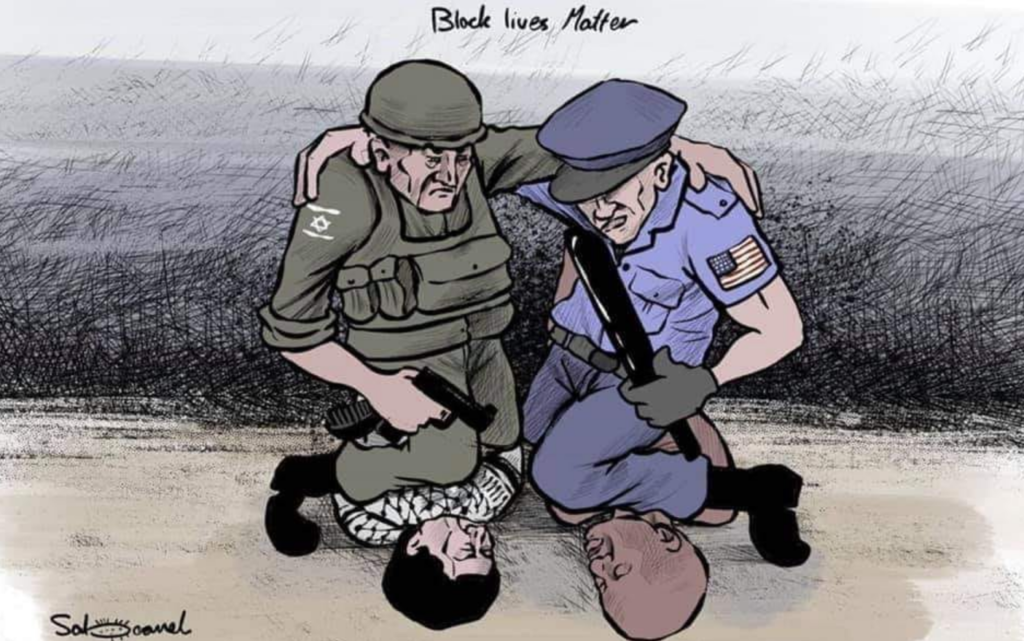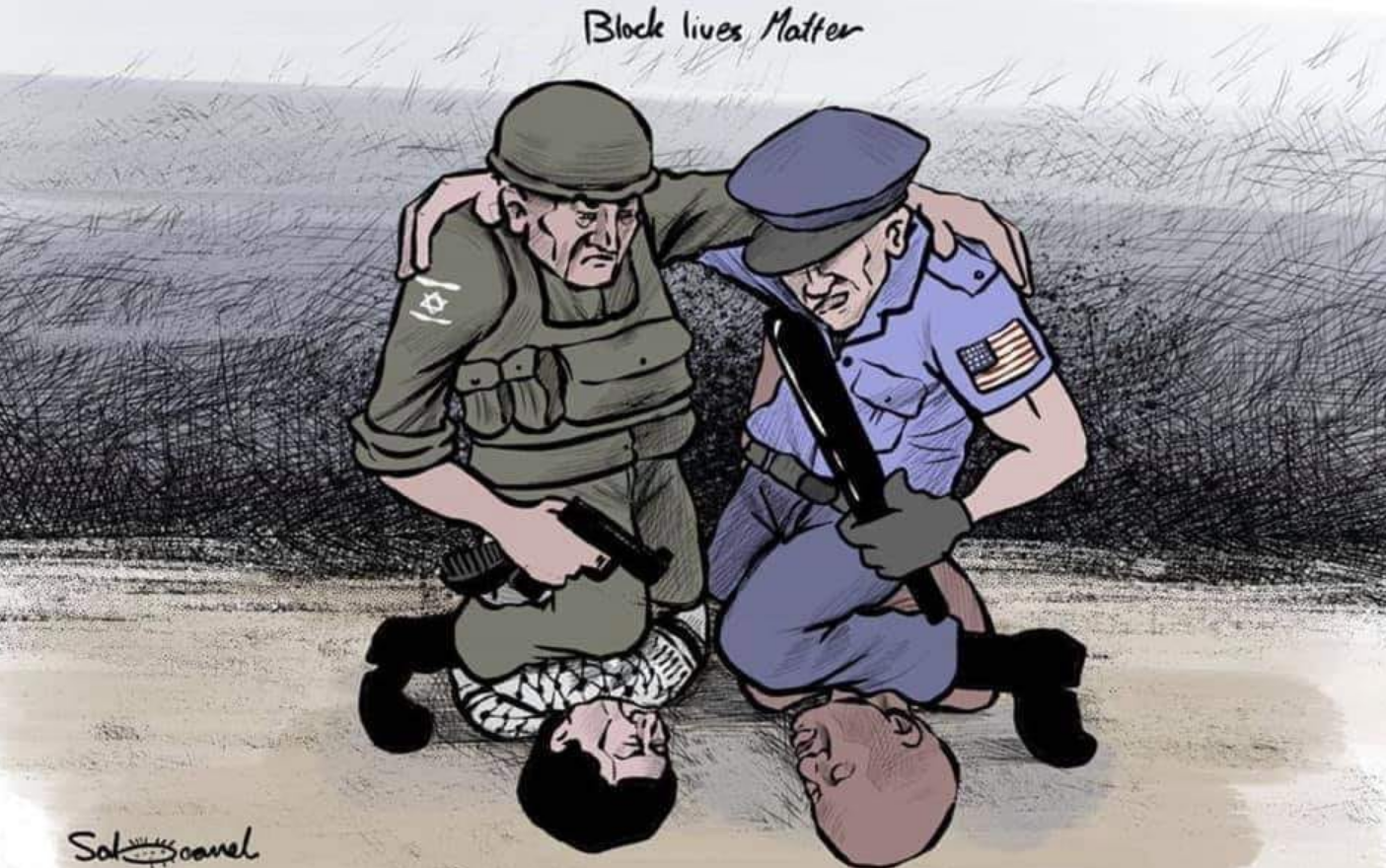
Further conflict is inevitable unless Washington ends Israel’s impunity and includes Palestinians in its global democracy agenda.
By Zaha Hassan, and Daniel Levy
The United States is not responsible for the new wave of violence, death, and destruction that is now engulfing Israel and the Palestinian territories it occupies and controls. But Washington should have seen it coming.
This explosion is the inevitable consequence of the permanent denial of basic Palestinian rights and freedoms by Israel, the matrix of discrimination and control that Israel imposes on every facet of Palestinian life, and the ongoing blockade of Gaza making life there ever more untenable. The U.S. government under President Joe Biden has adopted a depressingly familiar stance: meaningless calls for restraint from both sides, preventing action at the United Nations Security Council, and hiding behind the implausible notion that Washington has no leverage over one of its closest allies and largest aid recipients.
In recent weeks, there has been an uptick in aggressive Israeli measures toward Palestinians in East Jerusalem (especially in and around Al-Aqsa Mosque and the Old City during Ramadan), provocative policing tactics and greenlighting of marches by Jewish Israeli extremists, and planned forced removal of families from their homes in the Sheikh Jarrah neighborhood, an Israeli-annexed Palestinian area of East Jerusalem. This has coincided with Palestinians’ internal anger at the indefinite postponement by President Mahmoud Abbas of Palestinian elections planned to take place after a 15-year hiatus.
An administration that appeared determined to deprioritize the Middle East region and the Palestinian-Israeli conflict in particular now faces the prospect of engaging with a prolonged conflagration. The experienced set of diplomats assembled in Biden’s national security team should know better. Their own governmental experience has shown that the meetings and diaries of principals and deputy principals can too easily be consumed by Middle East conflicts, especially if Washington is behind the curve.
While Israelis and Palestinians are the primary actors in the current drama, the United States is indisputably the most consequential external actor in this arena. If Washington continues to get this file wrong, the consequences of Israel’s denial of Palestinian rights are guaranteed to impose themselves on a U.S. foreign-policy agenda that would prefer to be focused elsewhere.
Ignoring its professed commitments and values when it comes to Israel’s treatment of the Palestinians exposes the U.S. government to vulnerabilities that can easily be exploited by others.
The new administration should be concerned not just by the potential for distraction. There are at least two additional dangers. The first is domestic: A part of the Democratic Party and congressional caucus is insisting on applying universal standards of human rights and international law to the treatment of Palestinians, in unprecedented ways. That sits uneasily with a more conservative wing within the party, which has historically carved out exemptions for Israel—holding it to a lower standard and endorsing the narratives of the Israeli and American right.
The human rights community—including Palestinians, Israelis, and global groups—is documenting Israeli practices that they argue constitute the crime of apartheid at a moment when Democrats are increasingly rallying under the banner of racial justice. That will make the notion that justice is desirable—except for Palestinians—much harder to sustain. This rhetorical acrobatic act will also be hard to pull off in the international arena. The “America is back” message has been all about a law-abiding, norm-promoting, rights-respecting nation leading a resurgence of democracies.
U.S. foreign policy has always been good at managing inconsistency and hypocrisy, but being so out on a limb and so far from these professed commitments and values when it comes to Israel’s treatment of the Palestinians exposes the U.S. government to vulnerabilities that can easily be exploited by others. It’s not hard to imagine the refrain in Beijing: “You say Uyghurs, we say Palestinians.”
A rights-based approach to U.S. policy in the region would be more consistent with Biden’s overall foreign-policy agenda and would require less U.S. investment, not more. It could reverse the current negative trend lines and establish a new scaffolding on which future peace efforts could be built.
To achieve this, simply reversing the egregious excesses of the Trump administration will not be enough. The status quo ante, one embraced by previous Democratic administrations, already consisted of an upside-down incentive structure that worked against peace, in particular by guaranteeing Israeli impunity, thereby encouraging the most extreme tendencies in Israeli politics and entailing a heavy investment of U.S. diplomatic effort and capital.
This is not the time for Washington to offer a new blueprint for a solution nor to refocus efforts on sustaining a peace process that has long since suffered from the law of diminishing returns and failed to deliver in any meaningful sense, placing negotiations and territorial tinkering above the rights of people on the ground.
U.S. policy has been good at making sure Israelis get the security and well-being they deserve. U.S. policy has been spectacularly bad at applying those standards to Palestinians and at challenging the separate and unequal system in place. Things are guaranteed to get worse if Washington continues down this path—even if the diplomatic destructiveness of the previous administration is replaced by the apparent good intentions of its successor. The way to reverse that is to focus on human rights, dignity, and the right to live in freedom and equality.
The distorting impact of U.S. policies has been particularly pronounced when it comes to Israeli politics and public opinion. Washington’s indulgence of Israeli practices that contravene both U.S. policy and international law have contributed to the marginalization of pro-peace voices and empowered those with a “we can get away with anything” mentality.
U.S. policies—especially, but not only, under former President Donald Trump—helped nudge Israeli maximalism to the precipice of de jure annexation of Palestinian territories, while significantly advancing de facto annexation. Worse still, it enabled a sense among Israelis that the denial of Palestinian freedoms is manageable at a low cost, encouraging a nonchalance and hubris that have been upended in recent days.
A U.S. focus on ending the Gaza blockade and preventing land seizures, home demolitions and evictions; mass imprisonment (including of children); state and settler violence; and restrictions on Palestinian daily life—in America’s bilateral and multilateral policies vis-à-vis Israel—is the antidote.
Meanwhile, Palestinians must, of course, lead in renewing their own politics. However, the U.S. and Israeli preference for an unaccountable Palestinian leadership committed to the peace process status quo, rather than a representative and reempowered leadership that could more effectively challenge the occupation, has had a debilitating impact.
The Biden administration, despite its supposed commitment to revitalizing democracy globally, failed to come out in support of long-awaited Palestinian elections—whether rhetorically or in policies that would actually facilitate the conduct of those elections.
The U.S. government has instead hidden behind statements claiming that elections were a matter for Palestinians to decide, while it is Israel that’s preventing the Palestinian vote in East Jerusalem, and it’s the United States (alongside its Quartet partners Russia, the U.N., and the European Union) indulging rule by presidential decree in the Palestinian Authority and placing unique demands on Hamas, designed not to protect Israeli civilian life but to neutralize the prospects of Palestinian reconciliation.
A U.S. policy that remains on autopilot will fail. Although Washington did not initiate this new round of violence, it is perpetually putting its thumb down on the scale of further injustice and conflict. The current conflict may be a blip and end as abruptly as it began. But absent a change in the U.S. approach, renewed conflict is inevitable, and with each iteration the terms of engagement will deteriorate further and the United States will be left carrying an ever-heavier Middle Eastern burden as it seeks to focus its energy elsewhere.
Zaha Hassan is a visiting fellow at the Carnegie Endowment for International Peace’s Middle East Program and a former advisor to Palestinian negotiators. Twitter: @zahahassan
Daniel Levy is President of the U.S./Middle East Project and served as an Israeli peace negotiator at the Oslo-B talks under Prime Minister Yitzhak Rabin and the Taba negotiations under Prime Minister Ehud Barak.
FOREIGN POLICY


Leave a Reply
You must be logged in to post a comment.